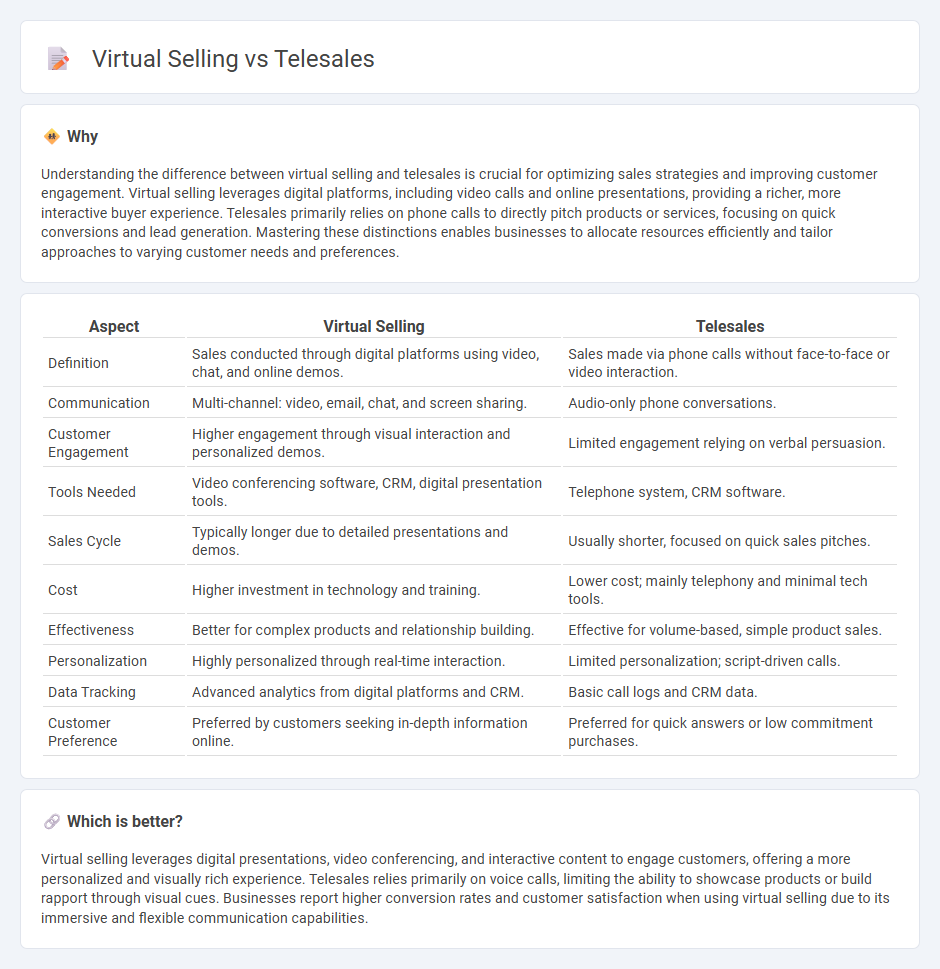
Virtual selling leverages digital platforms such as video conferencing and online chat to engage customers, offering a more interactive and personalized experience compared to traditional telesales. Telesales primarily relies on phone calls for direct communication but may lack the visual and multimedia elements that enhance customer engagement. Explore the differences and benefits of each approach to optimize your sales strategy.
Why it is important
Understanding the difference between virtual selling and telesales is crucial for optimizing sales strategies and improving customer engagement. Virtual selling leverages digital platforms, including video calls and online presentations, providing a richer, more interactive buyer experience. Telesales primarily relies on phone calls to directly pitch products or services, focusing on quick conversions and lead generation. Mastering these distinctions enables businesses to allocate resources efficiently and tailor approaches to varying customer needs and preferences.
Comparison Table
| Aspect | Virtual Selling | Telesales |
|---|---|---|
| Definition | Sales conducted through digital platforms using video, chat, and online demos. | Sales made via phone calls without face-to-face or video interaction. |
| Communication | Multi-channel: video, email, chat, and screen sharing. | Audio-only phone conversations. |
| Customer Engagement | Higher engagement through visual interaction and personalized demos. | Limited engagement relying on verbal persuasion. |
| Tools Needed | Video conferencing software, CRM, digital presentation tools. | Telephone system, CRM software. |
| Sales Cycle | Typically longer due to detailed presentations and demos. | Usually shorter, focused on quick sales pitches. |
| Cost | Higher investment in technology and training. | Lower cost; mainly telephony and minimal tech tools. |
| Effectiveness | Better for complex products and relationship building. | Effective for volume-based, simple product sales. |
| Personalization | Highly personalized through real-time interaction. | Limited personalization; script-driven calls. |
| Data Tracking | Advanced analytics from digital platforms and CRM. | Basic call logs and CRM data. |
| Customer Preference | Preferred by customers seeking in-depth information online. | Preferred for quick answers or low commitment purchases. |
Which is better?
Virtual selling leverages digital presentations, video conferencing, and interactive content to engage customers, offering a more personalized and visually rich experience. Telesales relies primarily on voice calls, limiting the ability to showcase products or build rapport through visual cues. Businesses report higher conversion rates and customer satisfaction when using virtual selling due to its immersive and flexible communication capabilities.
Connection
Virtual selling and telesales both leverage digital communication tools to engage customers remotely, streamlining the sales process without face-to-face interaction. Telesales primarily uses phone calls to initiate and close deals, while virtual selling encompasses a broader range of technologies such as video conferencing, social media, and chat platforms for a more interactive customer experience. Together, they optimize lead generation and conversion rates by enabling personalized, real-time engagements that adapt to evolving buyer behaviors in the digital marketplace.
Key Terms
Telesales:
Telesales involves direct phone conversations to promote and sell products or services, leveraging persuasive communication to drive immediate purchases and build customer relationships. Key metrics in telesales include call conversion rates, average handling time, and customer retention, emphasizing efficient interaction and personalized engagement. Explore how telesales strategies can boost your sales pipeline and customer loyalty by learning more.
Cold Calling
Telesales relies heavily on cold calling to directly engage potential customers through phone conversations, aiming for immediate sales conversion. Virtual selling incorporates cold calling but expands to include video calls, social media, and email outreach for a more interactive and personalized experience. Explore the distinct advantages and tactics of telesales and virtual selling to enhance your customer acquisition strategies.
Scripted Pitch
Telesales often relies heavily on scripted pitches to maintain consistency and control during phone interactions, ensuring key selling points are communicated clearly. Virtual selling, while also benefiting from a structured approach, allows greater flexibility to adapt scripts based on real-time customer engagement via video calls or interactive platforms. Explore how mastering scripted pitches can enhance both telesales and virtual selling strategies for improved customer conversion.
Source and External Links
How To Be Really Good At Telesales - MTD Sales Training - This page explains that telesales involves direct selling, appointment setting, and sometimes telemarketing, requiring confidence, practice, and a strong understanding of consumer psychology for success.
What Is Telesales? Definition, Agent Duties and Skills | Indeed.com - Telesales is the process of selling products or services over the phone, with agents focusing on building customer relationships, converting leads into sales, and reducing costs by minimizing field sales efforts.
What is Telesales? Telesales Vs Telemarketing | RingCentral UK Blog - Telesales specifically involves closing deals and selling directly over the phone, with high-quality customer service being essential for both sales and encouraging repeat business.
 dowidth.com
dowidth.com